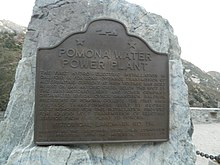| Pomona Water Power Plant | |
|---|---|
 The Pomona Water Powerplant, c. 1892 The Pomona Water Powerplant, c. 1892 | |
| Location | San Antonio Canyon, California |
| Coordinates | 34°12′43″N 117°40′34″W / 34.2118833°N 117.676072°W / 34.2118833; -117.676072 |
| Built | 1892 |
| California Historical Landmark | |
| Designated | Nov. 25, 1953 |
| Reference no. | 514 |
 | |

The Pomona Water Power Plant, built in 1892, was the first AC power plant in California. It fed electricity to the Pomona Valley, and was designated a California Historic Landmark (No.514) on November 25, 1953.
Description
The Pomona Water Power Plant was built by the San Antonio Light and Power Company. The Pomona Water Power Plant is located near Mount Baldy Village, California in Los Angeles County on Camp Baldy Road, San Antonio Canyon. Using alternating current the hydroelectric power plant was able to send AC power over long distance power lines at very high voltages. San Antonio Creek was used as the power source for the one phase dynamo alternator's power. The system was unlike Thomas Edison's low voltage Electric power distribution system, started in 1882, that could not use long-distance power lines. San Antonio Light and Power Company was the idea of the first president of Pomona College, Dr. Cyrus Grandison Baldwin. Baldwin joined businessman Henry Harbison Sinclair in starting San Antonio Light and Power Company. A.W. Decker was hired to be the chief engineer of the project. Decker had been train in the use of AC power and worked on the Mount Lowe Railway, above Pasadena. George Westinghouse's company, Westinghouse Electric Corporation built the high-voltage transformers need to increase the power plants voltage to 10,000 volts for the long-distance power lines that fed the city of Pomona 14 miles a way. The system started on Nov. 28, 1892, was so successful that a 29-mile line was add to fed power to San Bernardino, California. The San Bernardino power line was at the time the world's record for long-distance commercial electric transmission. Pomona Water Powerplant worked great, but Southern California rain and snow, the source of the power, is not guaranteed each year. The location of the power plant was not in place where a dam to store water for dry period could be built. As such, the power plant was not successful in future years. A.W. Decker's next project was at the Mill Creek project run by the Redlands Electric. There he used a system of three-phase power that was more efficient. It went on line on Sept. 7, 1893.
Marker

Marker on the site reads:
- NO. 514 POMONA WATER POWERPLANT – The first hydroelectric installation in California for long-distance transmission of alternating current at high voltage was built in 1892 on San Antonio Creek below this spot by the San Antonio Light and Power Company organized by Dr. Cyrus Grandison Baldwin, President of Pomona College. The first high-voltage transformers built by George Westinghouse for this installation provided for transmission of 10,000 volts from the plant to Pomona.'
See also
References
- "1891". Pomona College Timeline. 7 November 2014. Retrieved 10 August 2020.
- Cal, Parks Marker, 514, Pomona Water Power Plant
- Marker Database, 514, Pomona Water Power plant
- scvhistory.com, History (& Preshistory) of Southern California Edison, 1886 to Edison International, 2014
- Southland helped power electrical revolution, The Sun, By Mark Landis, September 27, 2010
- Brithinee Electric, San Bernardino Valley Electric Power Firsts and Benchmarks
- californiahistoricallandmarks.com 514
| Pomona, California | |
|---|---|
| Areas | |
| Primary and secondary schools | |
| Higher education | |
| Landmarks | |
| NRHP sites | |
| Transportation | |
| This list is incomplete. | |